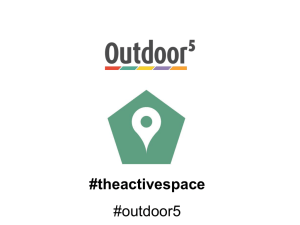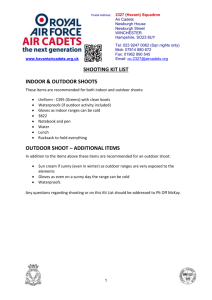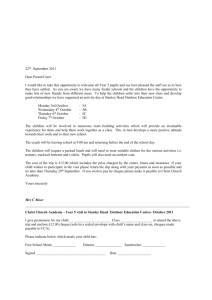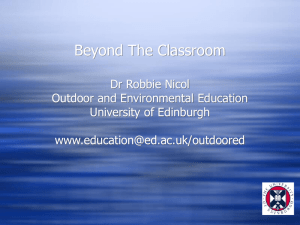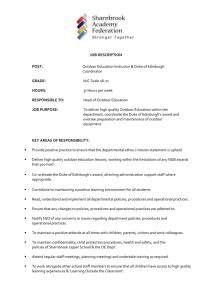ENCOUNTERING, EXPERIENCING AND EXPLORING NATURE
advertisement
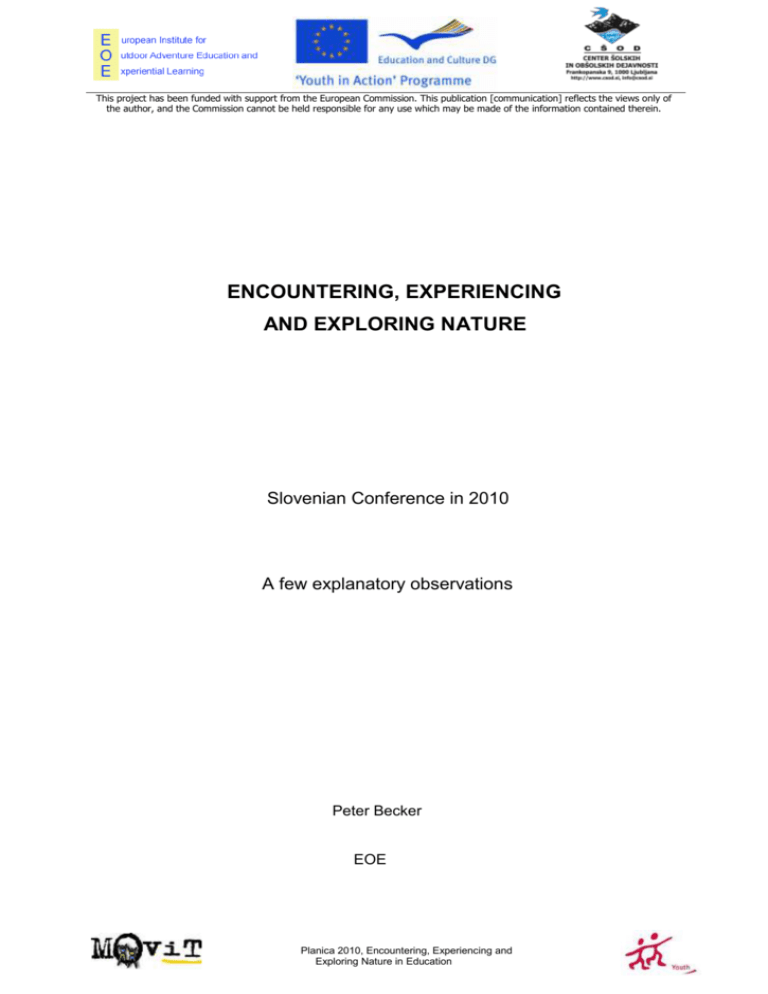
This project has been funded with support from the European Commission. This publication [communication] reflects the views only of the author, and the Commission cannot be held responsible for any use which may be made of the information contained therein. ENCOUNTERING, EXPERIENCING AND EXPLORING NATURE Slovenian Conference in 2010 A few explanatory observations Peter Becker EOE Planica 2010, Encountering, Experiencing and Exploring Nature in Education 2010 will see the conference of the EOE "Encountering, Experiencing and Exploring Nature“ in Slovenia, which will be organised together with the CSOD. CSOD means Center for School and Outdoor Education. It is an integrated part of the Slovenian Education Ministry. As such it organises outdoor activites with emphasis on natural sciences and sport as part of the extended curriculum of the nine-year elementary education, which every elementary school has to offer in addition to the compulsory curriculum. Although participation is voluntary, up to 60% of elementary school pupils take part in these activities every year, which the CSOD offers in 23 outdoor centres. It may well happen that children take advantage of this one-week opportunity every year during their time at elementary school. CSOD works in close cooperation with the university departments of pedagogics and sports. The theme of the conference of "Encountering, Experiencing and Exploring Nature", which is meant as reference to the different ways and purposes of approaching and using nature, was chosen by the EOE and the CSOD together and is based on the following considerations. The generally accepted educational philosophy of outdoor pedagogics is that a stay in natural landscapes and the confrontation with natural phenomena can provide a positive stimulus to the educational process of individuals. Why else would practitioners of this pedagogical approach in almost all European countries take innumerable groups out to walk over high mountains, gently sloping hills, sparsely wooded forests and through the purple heather of the moors, go canoeing on gentle or white-water streams, temporarily live the simple life of camping on beaches and in forest clearings, go on expeditions? Why else would one expose oneself to fog, snowfall and stormy winds, collect plants, stones and leaves, study water samples, build terrariums, aquariums or lay out a garden to plant flowers or vegetables, tend them, pick and harvest, or why else would practitioners take people on (day) trips, for example, to a lake in order to splash about or swim, take them to climb through a damp ravine up to a mountain hut to get a view of a glacier or take them on country paths to greet the bursting flowers of spring and on forest paths to enjoy the colours of autumn? 1 Although many stories are told about the activities people participate in, it is rather rare that one learns anything about the exact natural setting these described activities take place in.1 This is the more surprising since encounters with nature are not only a constitutive element of these practices, but also a determining factor for the kind of experiences that can be gained in these encounters. Does nature perhaps serve as backdrop, as an extended fitness centre or gymnasium, in which activities such as mountain biking, canoeing or climbing can be carried out? Is it a counter-world that offers activities that allow people to forget the pressures of everyday life, which is, in fact, where real life takes place? Is it a part of us, as the outside extension of our inner state, that we should treat cooperatively and like a friend? Is it a series of open and unknown situations that pose obstacles individuals need to overcome on their way to achieving their goals? Is it an accumulation of riddles, which - as with Francis Bacon - reveal their wisdom only in response to force and manipulation or does it take - as with Goethe - patient seeking and observation and total absorbtion with all one's senses to uncover their secrets? Or does it maybe present itself as a configuration of atmospheres, where burbling streams, passing thunderstorms, fir trees covered in new snow, campfires at night, billowing cloud formations, deeply red sunsets, imposing rock faces, etc., create the kind of aura that will remain engraved forever in our emotional memory? All these various natural scenarios are connected with different spheres of experience, which themselves make different demands on the individuals. Each individual situation requires not only different knowledge and physical routines but also different equipment, appropriate self-interpretation and motivation. 1 This statement is not true for those outdoor activities that aim to put across explicitly how worthy of protection nature is. In this context, the human competence to interfere in natural processes and ecological units, such as forests, streams, lakes, etc., as well as the competence to exploit natural resources against the setting of zivilisationskritik, is rated as low. Therefore practices are carried out to develop appropriate patterns of awareness and action. The German biologist and teacher Gerhard Trommer,for example, tries with his concept of "gentle walking" to leave as few traces as possible in the areas visited. A heightened cause for alarm is created by the perceived self-endangering due to environmental destruction, which is practically added to the threat to natural resources. 2 However, what is demand on the one hand, is opportunity on the other hand. The demands of natural situations that need to be tackled open up opportunities to gain experience in a ludic way and to acquire different ensembles of physical practices, habit and knowledge, which support the appropriate way to handle the natural situation. Depending on the disposition of the individual the following types of logic can be perceived: the aesthetic, modest logic of observation, the caring logic of preservation, the logic of discovery and of adventurous travel that is open to the future, the pedagogical logic of using it as an instrument, the sober logic of unravelling, the inconsiderate, narcissistic logic of seeking self-awareness, the engineering logic of interference and manipulation or the ascetic logic of the simple life. In consideration of the fact that meanwhile many professionals (teachers, social and youth workers, therapists, counsellors) use outdoor practices in their everyday work, we think that it is a worthwhile project to initiate a European discourse about the different ways of gaining access to nature in outdoor practice approaches, about how they are taught at university and about their consequences by means of the planned conference on "Encountering, Experiencing and Exploring Nature". 1. Concepts of nature in outdoor study programmes of universities and technical colleges of higher education As mentioned before, outdoor activities are increasingly being integrated into the work of professionals who, in their capacity of aiding helpful intervention, strive to give people support to get the most out of their lives. Our partner in this cooperation, CSOD, is an excellent example of how the content of school curricula is processed didactically by means of outdoor practices. In Sweden there is a university department that is exclusively concerned with how to combine natural processes and natural phenomena with the teaching of school subjects. Scandinavia has also been the origin of forest kindergartens, which have become wide-spread and which conduct their daily preschool activities preferably in different natural spheres. More in the Anglo-Saxon language area therapeutic concepts have been developed that make purposeful use of nature as medium for their intervention. Even rather peculiar developments which see therapy - independent of any kind of existing psychological 3 stress - as a technique of self-enhancement and narcissistic self-fulfilment refer to natural spheres. Outdoor activities are as much part of the method inventory in the field of social work, especially in youth work, as in the area of further education provided by consultancy agencies that train highly qualified executives, for example, in leadership and communication competence. All these approaches with their different ideas of nature are taught in study programmes and further education courses that are offered at universities and technical colleges of higher education but also in the market place. Comparing their understanding of nature may not only make plain what common ground these individual approaches share or where they are special; through looking at concepts of other European universities it might also help to sharpen our own profiles and especially extend our own range of possibilities. Considering the limited time available for the conference, it will surely not be possible to compare the approaches of all the professions mentioned above. It does, therefore, make sense to focus on those occupational fields that are represented by the two organisations that are staging the event, without absolutely excluding others from making presentations. 2. Outdoor practices at school and vocational training 2.1 School-related aspects: As not only Slovenian and Scandinavian but also historical examples of (German) reformpädagogik show, there have been many recurring attempts to dissolve the logic of regular schools with their traditional architectural conditions of the roof-covered right angle, in order to discover opportunities for learning and education in seemingly chaotic nature. This is apt to lead to the conflict of whether this (temporary) change is to be subordinate to the established and legitimized educational goals of the curriculum or whether a quite different, more holistic means of education is to be aimed for. The conference should take up these developments and the debates and discourses that go along with them and should set up relevant presentation and discussion forums. 2.2 Aspects related to vocational training: An important step in everyone's life is the transition from the educational system into the labour market. For some time now, 4 this step, which had always been a critical one, has been even more problematic, due to the crisis in the working community, which has led, among other things, to a steady loss of job opportunities, especially for unskilled workers. In particular for young people finishing secondary education with only the most basic leaving certificate it is becoming increasingly difficult to find appropriate employment that will secure their livelihood in a satisfactory manner. Losing work at the same time seriously injures people's psychosociosomatic integrity, which in turn entails various forms of humiliation. This is made even worse by the fact that people looking for jobs often do not have the qualifications that would allow them to react adequately in a deregulated market. For this constantly growing group of young people the EU has coined the label of "Youth at Risk".2 Given the powerlessness of politics it seems that the market will not change its conditions for quite some time to come, meaning that individuals will be forced to adapt to the conditions of the market. If one wants to prevent or mitigate this threatened state of exclusion of specific groups, one will have to provide opportunities for them to catch up on their inadequate socialisation. It has been shown that outdoor activities and confrontation with natural situations can constitute suitable media to impart the competences that these individuals failed to acquire earlier more easily later. (BECKER, et al. 2005; BSJ MARBURG/ THRESHOLD CONSULTING 2008) This is a rough description of the double topic of the second focus of the conference. Specifically, the issues to be discussed here will not only have to cover the conditions necessary for effective implementation, the reach of specific activities or the forms of their implementation and dissemination, but also the issue of forward-looking cooperation between school and youth work with regard to the confrontation of natural situations. 3. Examples of successful practice, principles of successful practice 2 In the face of unemployment due to structural causes the question of appropriate levels of qualification would become superfluous if the forced connection between work performance and secure livelihood was decoupled, as proposed in the various models of unconditional basic subsistence cover. 5 The third thematic focus should be on a problem that the European education discussion has been concerned with for some time. What is meant is the issue of quality assurance of pedagogical work. Even though the business vocabulary normally used in this discussion, such as standardization, output-orientation, best practice, benchmark, workload, etc., is regarded as fundamentally inappropriate, the question remains of how conditions can be created that will, if not guarantee the successful outcome of educational processes, make success more probable. That educational processes, given their critical nature, can fail is on the cards. If they could not, they would not exist, they would just be an endless repetition of the same. Something new can only evolve if the possibility of failure is implicit in educational endeavour. This is not the place to enter at any length into the problems and consequences resulting from imposing economic principles on educational processes at school and in youth work. The place for such discussions and the presentation of nature-related practices might be the events with this focus. There, on the basis of problems arising from practice past and present, one might discuss and demonstrate what cornerstones should be set for educational process taking place in and with nature and according to which principles open educational work should be planned and carried out. Literature BECKER, P. et al.: The Next Step. Adventure and Outdoor Activities for Youth at risk in the Transition from School to Work, Marburg 2005 BSJ MARBURG/ THRESHOLD CONSULTING: Learning Out Doors. Support for Young People in Risky Transitions, Marburg 2008 6
